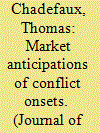| Srl | Item |
| 1 |
ID:
152305


|
|
|
|
|
| Summary/Abstract |
Does the recurrence of wars suggest that we fail to recognize dangerous situations for what they are, and are doomed to repeat the errors of the past? Or rather that policymakers correctly anticipate the consequences of their actions but knowingly choose conflict? Unfortunately, little is known about how well wars are anticipated. Do conflicts tend to come as a surprise? I estimated the risk of war as perceived by contemporaries of all interstate and intrastate conflicts between 1816 and 2007. Using historical financial data of government bond yields, I find that market participants tend to underestimate the risk of war prior to its onset, and to react with surprise immediately thereafter. This result illustrates how conflict forecasts can be self-fulfilling or self-defeating. Present predictions may affect future behavior, such that wars may be less likely to occur when they are predicted, but more likely when they are not. I also show that the forecasting record has not improved over the past 200 years, and that wars involving democracies lead to greater market shocks. These findings also have implications for the way decisionmakers respond to new information, and how audiences perceive the risk of war and hence their leaders’ actions.
|
|
|
|
|
|
|
|
|
|
|
|
|
|
|
|
| 2 |
ID:
189695


|
|
|
|
|
| Summary/Abstract |
Following the 2008 global financial crisis, years of low interest rates provided a rare opportunity for many developing nations to borrow in international markets—whether issuing bonds in their own currencies, securing loans from private-sector banks and commodity traders, or borrowing from China, which emerged as a dominant official creditor. Developing countries’ overall external debt rose to a record level during this period. As central banks raise interest rates sharply to counter a global rise in inflation, many of these countries are at risk of default. The mix of public and private creditors and the opacity of many loan terms make it difficult to coordinate restructuring. The key factor may be domestic politics.
|
|
|
|
|
|
|
|
|
|
|
|
|
|
|
|
| 3 |
ID:
186369


|
|
|
|
|
| Summary/Abstract |
European monetary policymakers face tough choices regarding the inflation and uncertainty fuelled by the war in Ukraine. They need to bring an end to the large-scale asset purchases and negative interest rates that have been the bulwarks of monetary-policy accommodation since 2015. They must also ensure that European monetary policy can be applied across countries while holding down the differences in sovereign borrowing costs between those governments that are financially strong, such as Germany, and those that are in a weaker position, such as Italy. Any solution to the problem of widening borrowing costs that is consistent with fighting inflation will impose losses on the central banks of stronger countries, while making it cheaper for those governments that receive support to borrow. Whatever it decides, the European Central Banks’s Governing Council does not have to be political to be perceived by the European public as making a political choice.
|
|
|
|
|
|
|
|
|
|
|
|
|
|
|
|